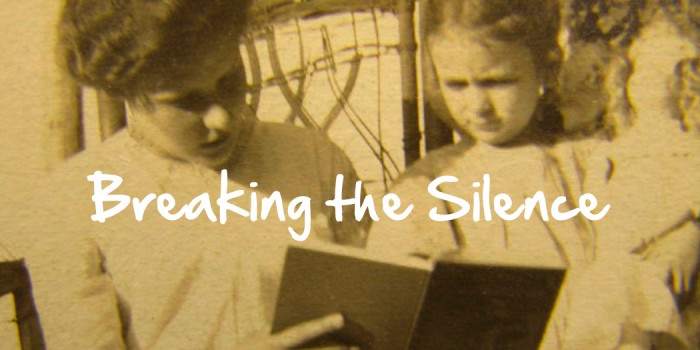Breaking the Silence
by Melissa Palmer
“We’ll need to address your daughter’s depression.” The doctor had said it as if it were an afterthought, a plate of French fries tacked on to the side of the main course, her autism. My seven year-old has a high functioning form of ASD some doctors still refer to as Asperger’s. It’s characterized by anxiety, repetitive movements, concrete thinking and an inability to read other people’s emotions as well as several other idiosyncratic behaviors that my husband and I, and even her little sister had gotten used to. But depression? Depression was no side dish, not for me. It was the first time in my experience as a mother that I ever thought-Please, not my kid.
It seems so silly now thinking about that, that those words were the first to go through my head, considering by then we’d already gone through a full school year with Pippy’s diagnosis. We had a full year knowing there was a reason why she twitched and pulled her hair, why she was petrified of toilet sounds and bright lights, why she grunted and ate paper. For a full year we had the answers we’d been searching since she was just a little baby. And we had gone even longer than that knowing we have to speak literally, that a phrase like I love you to the moon and back serves no purpose in her world but to confuse. We’d also had plenty of time to get used to the way other kids looked at her on playgrounds when she spoke in gibberish or repeated strange sounds, or at parties when she professed her name was Tobor the Robot or that she was “a little girl from Greece named Vanessa who doesn’t talk.” We’d had plenty of time to get used to all of it. But yet it was on that day that I felt dread. Because of one single word.
I watched my mother struggle with bipolar disorder through my entire childhood. From the first time I could remember until the last time I saw her, there was a battle going on inside of her. She was the most beautiful and creative person I’d ever met, the singing, loving, kind Mommy who had a joke or story for every occasion and a spot at the dinner table for any kid in the neighborhood who needed one. But then a switch would flip and either anger or sadness would win out and pull her away from us for days at a time. Sometimes she would drift off to a quiet, unspeaking place. Those days she would lay on the couch still as a rock, and we knew not to bother her for snacks or tying shoes. On others she would rage over math papers or badly posed pictures, pulling frames from the wall and breaking them to pieces. All of that seemed difficult but none so much as the silence we all maintained to keep it hidden away. We never talked about the illness, to anyone. Nor did we acknowledge that sometimes mom went away for months at a time for treatment.
For whatever reason, we were told not to. Everyone close to me told me to leave it alone, to never tell anyone that mom was sick or crazy even though I never thought of her as either. I just knew she was hurting. But even as such I couldn’t tell, because there were kids who would make fun of me they said. Sure, there were. But crappy kids are crappy kids. If it wasn’t mental illness, they would have cracked on my overbite or my cheap shoes. But my family didn’t see it that way. It was supposed to be a secret. What was worse was everyone talked to my mother like she was a big, dumb child. And when they weren’t talking to her, they were talking about her like she wasn’t there and that was what hurt her even more. My family wanted to protect me. But I felt like I was the only one protecting her.
When no one was around my mom would tell me that she felt stupid, like she didn’t have the mental power to control what was happening inside her mind, like only a weak woman needed mommy’s little helper pills to make the world an easier place. Back then it was the 80’s, and that was the common idea. And even now, I wish I could go back in time and tell her it just wasn’t so.
My mom hated taking those pills. She would ditch them for days and then start spiraling down. So then she’d have to double or triple her dose, and end up sleeping for days which would make her skip pills all over again. It was a vicious cycle that rolled halfway into the next decade until it became too much for her heart to take. To this day I think the stigma had just as much to do with her suicide as the illness itself.
Stigma is probably why I dragged my feet the first time we had to see the new psychiatrist that day in the office. I didn’t want anyone making my daughter feel like she was sick or crazy. I wasn’t going to let anybody put that on my little girl. Pippy has her quirks and her anxieties. At night she has violent nightmares, and she has an irrational fear of accidental poisoning but I always thought of it all as manageable. I didn’t want her to have to relive all of that information with a new doctor, with a stranger. And I was trying to protect her.
That day I heard my second grader tell a virtual stranger that she had thought about killing herself. I looked at my little girl and saw my mother’s suffering eyes.
The doctor asked, “Would you be willing to try medication?”
I’d be willing to go to the damn moon and back.
 BIO
BIO
Melissa Palmer is also the author of A Life Less Normal, a memoir examining the life of a woman child growing up in the shadow of mental illness with the support of her proverbial north Jersey crime family. She was nominated for the Pushcart Prize for short fiction “Mrs. MacMillan’s Garden” which was the inspiration and backbone of Twin Oaks. She was nominated for the Eric Hoffer Prize for short fiction for her story “Blood”. But of all the honors she was most touched when the McStorytellers named her an honorary Scot for her story “At This Moment”. Her work has been featured by Hospital Drive, Best New Writing, The Quotable, and The Writing Disorder among others. Her short stories range from absurd to dark and in a former life she wrote a prize winning haiku for the show Spaceghost Coast to Coast. In her spare time she wrangles Newfoundlands, two precocious girls, and one very handsome cat with the help of a strong silent drink of water with whom she shares her life. She is never not writing, frequently baking, and always a little off-center.
.














